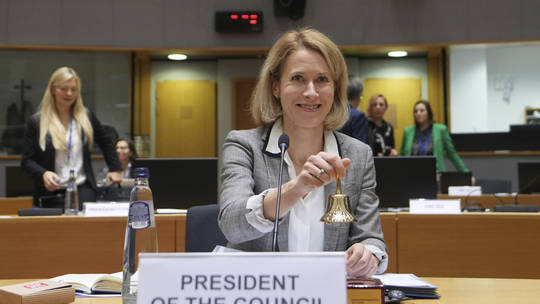EU’s Kallas rules out lifting Russia sanctions
18.01.2025 13:51
 Photo: AP / Virginia Mayo
Photo: AP / Virginia Mayo
Brussels has imposed 15 rounds of restrictive measures against Moscow since the Russia-Ukraine conflict escalated in February 2022. Extending the sanctions past January 31, however, requires a unanimous vote by all EU member states.
“We definitely need the sanctions in place. This is our leverage, and it would be very strange to give it away,” Kallas told reporters on Friday.
“Things haven’t changed. [Russian President Vladimir] Putin hasn’t changed his goals and nothing has changed on the ground. So there is no basis for lifting the sanctions,” she added.
Hungarian Prime Minister Viktor Orban has refused to commit to extending the sanctions until he can discuss them with US President-elect Donald Trump, who is scheduled to be sworn in on Monday.
In his weekly interview with Hungary’s Kossuth Radio on Friday, Orban argued that the EU needs to adapt to the fact that “a new era is beginning” with Trump coming back to the White House.
“It is time to throw the sanctions out of the window and establish a system of sanctions-free relations with Russia,” he said. “That is a long way off, but we have to work on it.”
At the moment, however, “the signs coming from Brussels are not encouraging,” Orban added.
Trump initially vowed to end the Russia-Ukraine conflict as soon as he takes office, but recent comments from his team have indicated a longer time frame.
“Whatever the negotiations then we will be in a much weaker position” if the sanctions are lifted, Kallas argued. “I also don’t think that it’s in the interest of the US to give up the sanctions now.”
The outgoing administration of President Joe Biden has tried to “Trump-proof” the sanctions by moving some of the targeted persons and entities from a blacklist declared by the executive branch to one enacted by Congress, with the goal of making them much harder to lift.
Kallas was the prime minister of Estonia before she was tapped to head the EU’s foreign policy division last fall. Along with the other two Baltic states and Poland, she took a hard line on Russia and in support of Ukraine. Meanwhile, Orban has called for peace talks, refused to provide any weapons or ammunition to Kiev, or allow military supplies through Hungarian territory.
EU leaders are concerned that if Hungary succeeds in letting the sanctions expire, Russia could recover almost €200 billion ($205 billion) in frozen central bank assets held by the Belgium-based Euroclear.
The bloc is reportedly considering having the Belgian king invoke a 1944 decree to block any transfer of assets from the country, putting Belgium in legal jeopardy rather than the EU.
Оригинал публикации: https://www.rt.com/news/611116-eu-russia-sanctions-kallas-orban/
